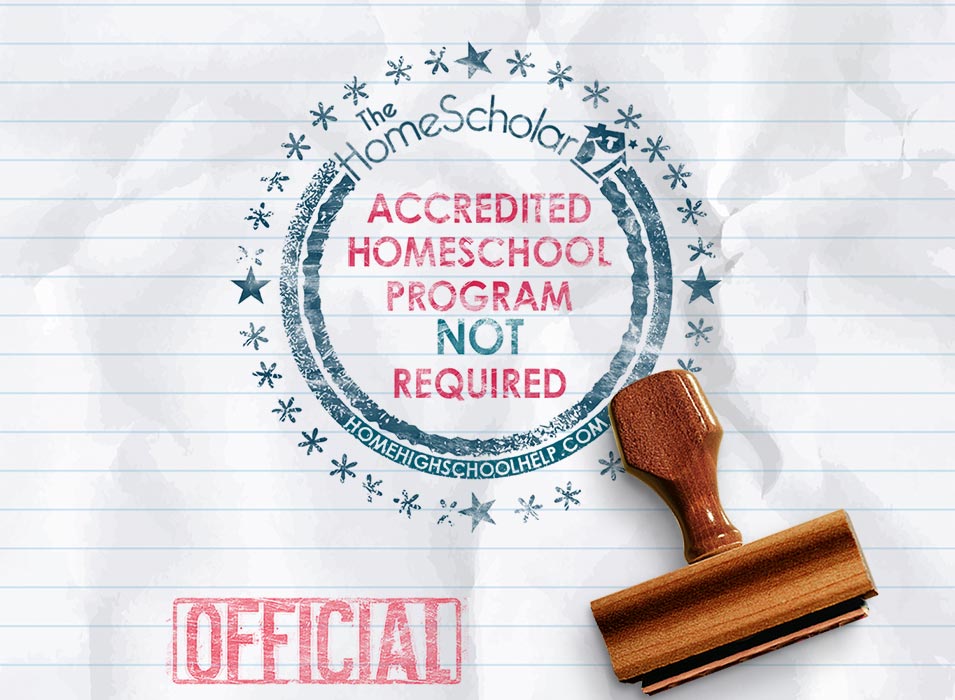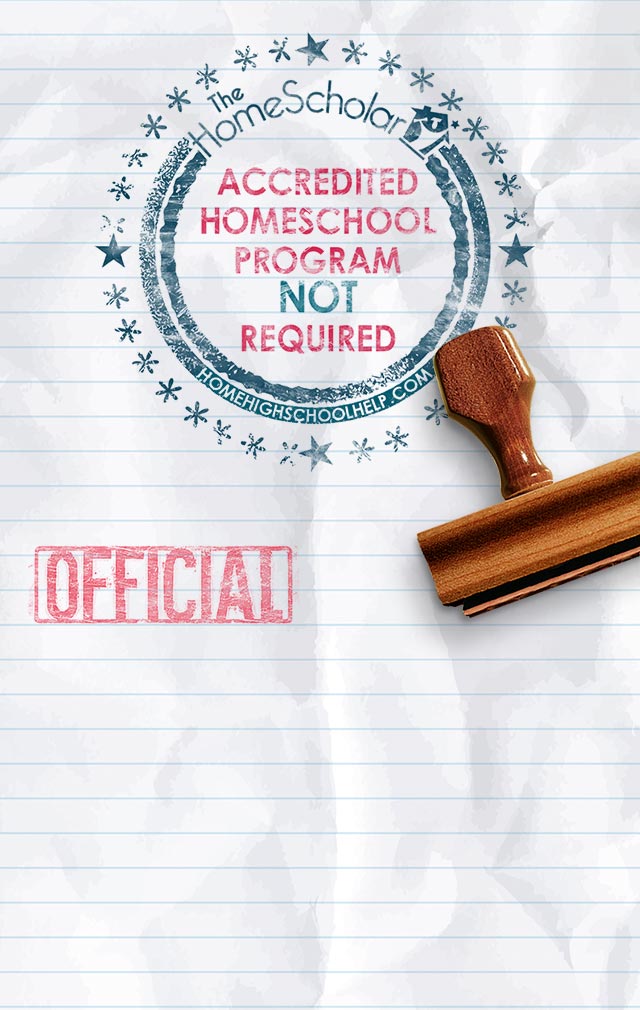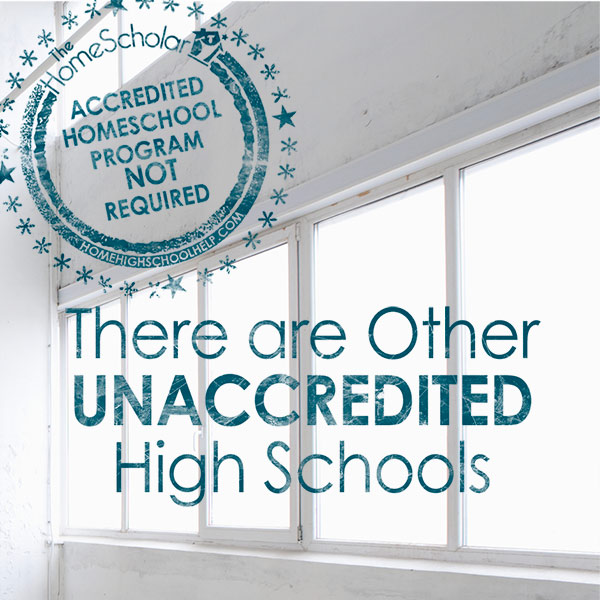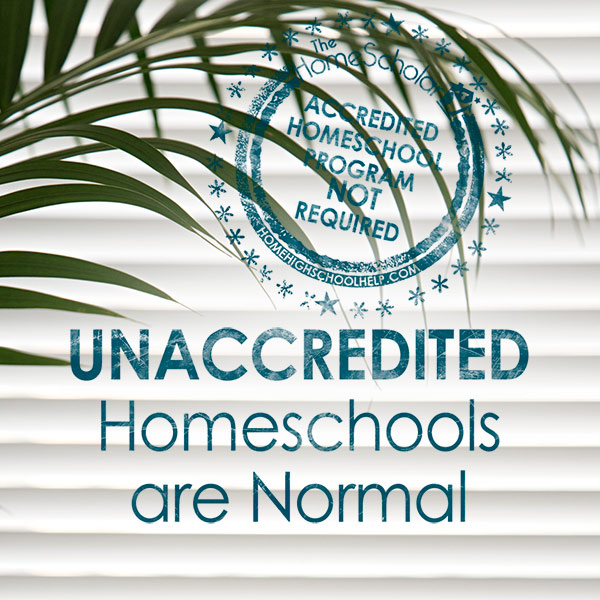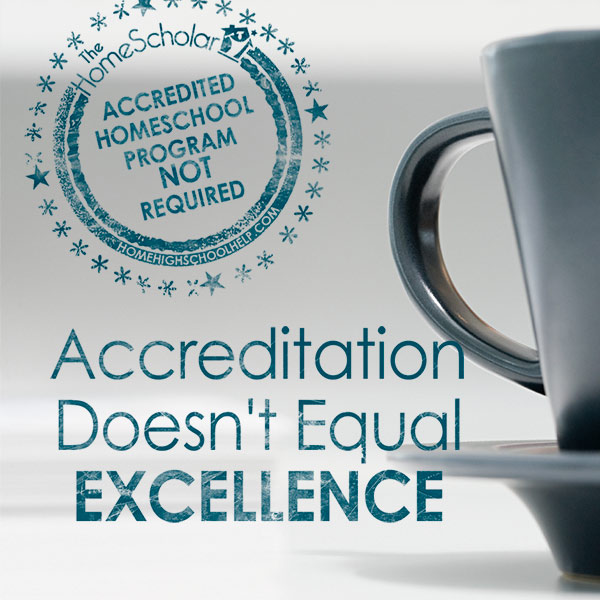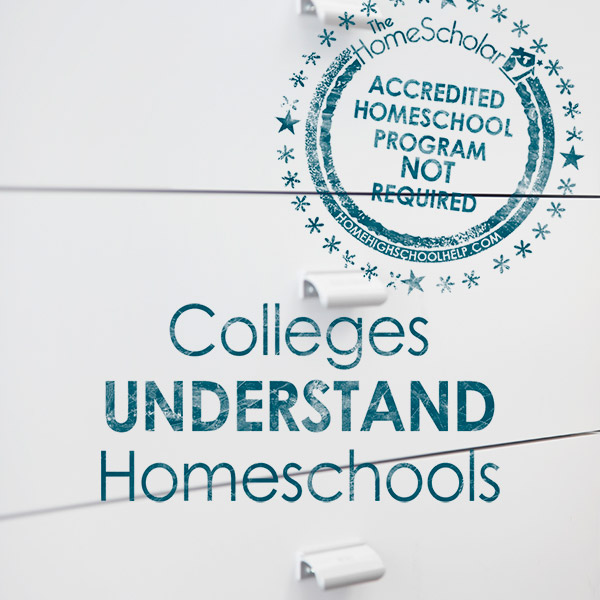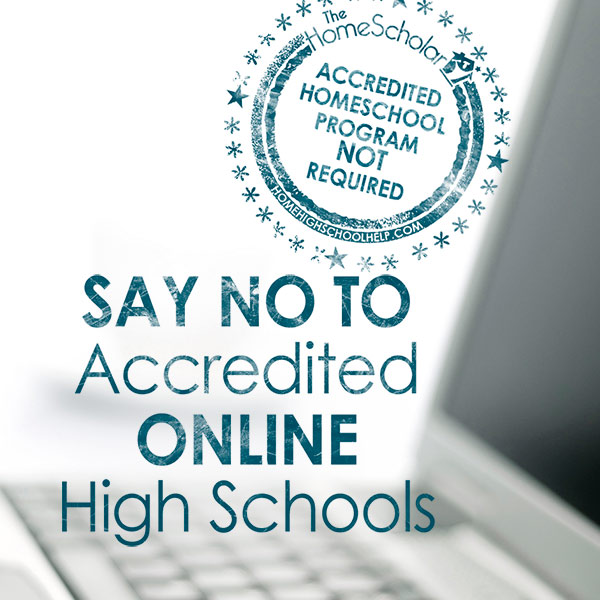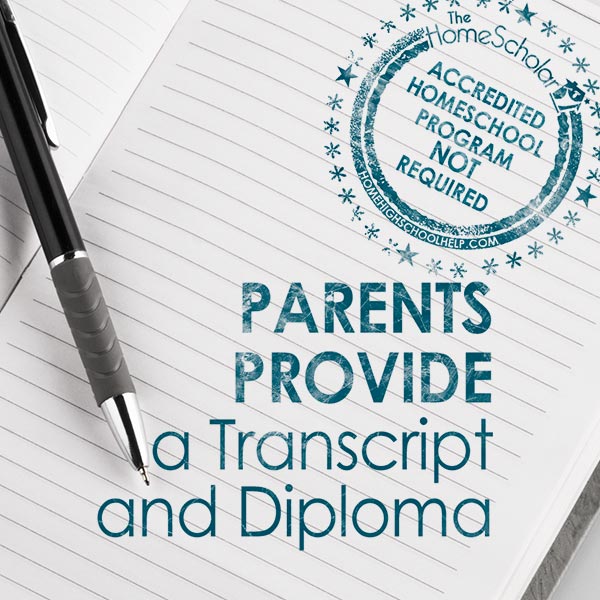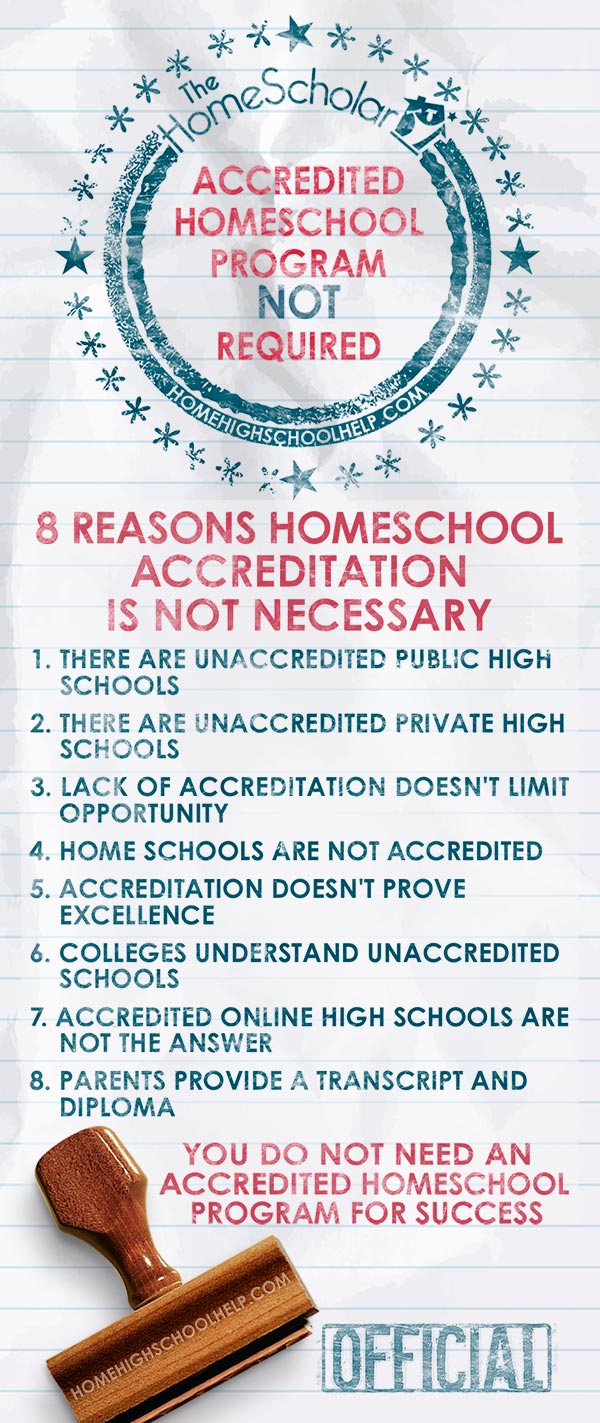Quick Links
Need to Homeschool High School?
Let me show you how!
Unaccredited Public High Schools
You might not be aware but there are public high schools across the nation that are not accredited. I contacted the Washington State Superintendent of Public Instruction, asking how I could determine which public high schools in my state are accredited. I received this surprising response;
“While most public Washington State High Schools are accredited, not all are. Each school, public or private, decides if they want to go through the accreditation process. You would need to contact each school individually to determine their status.” ~ Ms. Dopson, Executive Services, K12.WA.US
Each individual school makes the decision about accreditation. Some public and private schools decide that it’s not worth the hassle, so it must not be important to those schools. Apparently, it is not a significant issue for the public to know either, since there is no state registry, and parents have to contact their district and schools individually. My local high school made no mention on their website about being accredited. Apparently, they work under the “don’t ask, don’t tell” philosophy.
In Florida, for example, only 60% public schools are accredited. Every state has their own policy on notifying the public about accreditation status. While 98 percent of public high schools in Massachusetts are accredited, parents may be shocked to discover their local school is not. How will you know if a local high school is unaccredited? It’s possible nobody will tell you.
Unaccredited Private High Schools
Not all private schools are accredited either. Years ago, in Florida, only one-third of private schools were accredited. That represents a lot of students in just that one state.
High schools remain unaccredited for good reasons. Accreditation is expensive to attain, costing $25,000 or more, with annual dues for as long at accreditation is maintained. Some schools decide it simply isn’t worth the money.
Colleges understand how to deal with unaccredited high schools. As homeschoolers, our high school is also not accredited, and that’s perfectly acceptable. You do not need to use an accredited homeschool program.
Lack of Homeschool Accreditation Doesn't Limit Opportunity
What are the implications for the student? Consider what a student should do if their public high school is unaccredited. One school district webpage in Missouri clearly explains that lack of accreditation does not limit the opportunities for students. Like I have been telling parents for years, accreditation isn’t a panacea, a “be-all-end-all.” This is how that public school district explained to parents the consequences of being unaccredited.
May students transfer from an unaccredited district to another district?
Yes, if another district will accept them.
Does unaccredited status affect students’ diplomas?
Students who graduate from an unaccredited school district still receive diplomas.
What about admission to college?
The unaccredited status of a school district should not have a negative impact on a student’s admission to a college or university. [Because] higher education institutions typically consider multiple sources of information
What about eligibility for scholarships?
Students who graduate from an unaccredited school district should still be eligible for any scholarship for which they would otherwise qualify.
Unaccredited Homeschools
It’s interesting to read the no-nonsense, the-sky-isn’t-falling response to parental concern about accreditation. Consider their advice, and apply it to unaccredited transcripts made by homeschool parents.
Let’s turn that explanation to unaccredited homeschools. Can you transfer into a public or private school? Yes, if the school district chooses to accept them. Can you give a diploma? Yes. Can students enter college? Yes, a lack of accreditation does not impact college acceptance. Can students get scholarships? Yes, if they would otherwise qualify.
Accreditation can be purchased, when you register with an organization that is accredited, but that always has a cost. Sometimes the cost is merely financial, costing many thousands of dollars. Always the cost includes the freedom to homeschool as you wish, and you lose the freedom to choose curriculum that fits your family and your student.
.
Homeschool Accreditation Does Not Prove Excellence
What happens when a school district IS accredited? The truth is, nothing wonderful suddenly occurs. Schools are still schools, whether they are accredited or not. In my state of Washington, for example, the “report card” from the Superintendent of Public Instruction is dismal. A few years ago, I looked at their academic results.
In public high schools, the dropout rate in Washington was 5.6% every year. Do you know any homeschoolers who have dropped out of school before their parents graduated them? Only 72% of children graduate high school within 4 years. When given more years to complete high school, only 77% will graduate. I’m not a math genius, but doesn’t that mean roughly 25% don’t graduate high school at all? In our state, they spend over $18,000 per student, per year, yet only 30% of public-school students met standards in math. Only about 50% meet standards in English. How is your homeschooler doing in English and Math? Are your students at the 50th percentile or above? Are they functioning at grade level? What percentage of your students will graduate, even if they choose to graduate late?
Colleges Understand Unaccredited Homeschools
At most universities, home educated students are treated the same as public school students who attend a non-accredited public or private high school. We have good reason to be calm about accreditation.
Consider students at unaccredited public schools. Colleges and universities will view a homeschool the same as a public or private school that is not accredited. Do you know if your local high school is accredited? How would you know? There is no national list of accredited public and private high schools that I could find. There were partial lists involving other states, but none that listed my state schools in Washington.
Most parents assume their local high school is accredited and happily go about the college admission process oblivious to the truth. There are dozens of articles and reports in the media about the “education crisis,” but none about the “accreditation crisis.” That’s because there is no “accreditation crisis.”
Public school children who move between an unaccredited school and an accredited school may experience difficulty. Homeschoolers may as well. Children who move from district to district may also suffer. I’ve heard from many parents who have started homeschooling after they move because of the trouble they had with the local public school about inappropriate grade level assignments. That isn’t an issue for homeschool families. We can always teach our children at their level, regardless of how many times we move from district to district.
Universities have a very sophisticated method in determining the suitability of prospective students. Whether their diploma is accredited or un-accredited, whether they come from a public school, private school or homeschool, universities take the same “trust but verify” approach. An accredited diploma or transcript is not carte blanche to university admission. The lack of accreditation does not prevent acceptance.
Accredited Online High Schools Are Not the Answer
Some worried parents look to online schools to solve their accreditation concerns. Online schools are not the solution. Teens should have only 2 hours of technology per day, according to the American Academy of Pediatrics. Any online school goes FAR over the acceptable limit on time spent online. Learn more about technology use and guidelines in my book: TechnoLogic: How to Set Logical Technology Boundaries and Stop the Zombie Apocalypse.
When families sign up for those schools, they own you. They become the decision-makers. They can choose whether or not you will be allowed aspects of educating your child. Expecting the approval of others does not improve education. Because they are accredited programs, they must do certain things to maintain their accreditation, and all those things make it very difficult to homeschool naturally, and at the same time they dramatically increase the record keeping requirements of parents.
Online schools are businesses that make money when parents feel incapable. Their ads and offers imply that homeschooling independently is "less than" their options, as if certified teachers with approved curriculum are the answer. If that were true, public schools would be thriving, wouldn’t they? Instead, these online schools have strings attached. There are legitimate reasons why some parents choose other educational options. I believe that parents know the needs of their children best. At the same time, I get frustrated with online high schools trying to convince great homeschool parents that they are 'less than" in some way. You aren't!
Some online schools are not accredited, and may be viewed as diploma mills. This might cause serious problems, particularly for NCAA athletes. How do you know which online school is respectable? It can be very difficult to know which is which, because those schools continuously change their names. Read the Federal Trade Commission Report: These online high schools didn’t make the grade.
You can provide a perfect-fit, academically rigorous, college-prep or career-track high school at home, and it can always meet the needs of your child with maximum flexibility on a day-to-day basis. You do not need state certified teachers, because you know your child best, you are best equipped to guide your child. If they offer a one-to-one approach to education, that's also the very essence of homeschooling, but when homeschooling with can tailor our approach to best for our child. You do not need accreditation, because not all public or private high schools are accredited, and colleges understand that. You don't need a magical-sounding "credit recovery course" because we already have that, and it's called "delight directed learning." You do not need online schools or classes, because online learning is not optimal as a primary source of education, and is best used as a supplement.
They may boast of flexibility, but there is nothing as flexible as homeschooling. They may promise affordability, but nothing is as affordable as homeschooling, and it can fit every budget. They may proclaim they are self-paced, but that is the very essence of homeschooling.
Parents Provide a Transcript and Diploma
A homeschool diploma has value; it is not the same as a diploma mill. Unaccredited public schools can provide a diploma, and so unaccredited homeschool families can do the same. Providing your child with a diploma is a meaningful rite of passage. A quick visit to HomeschoolDiploma.com can provide that symbol of success. Yet education is not about the piece of paper. The paper doesn’t matter—the education matters.
The education you give your child will determine their ability to get a good job, get into college, and get great scholarships. Accreditation doesn’t determine those things. Educational achievement does. You can provide an official homeschool transcript that will open doors for your child.
Colleges understand unaccredited high schools, but your local public school may not. If accredited, a public high school may need to fight hard to maintain their accreditation. For that reason, it may be difficult for an unaccredited homeschooler to enter an accredited high school. It is significantly easier for the same homeschooler to get into a high-quality college.
An Accredited Homeschool Program is Not Needed for Success
Homeschoolers have a competitive advantage, because we know our child and want what is best for them. We are the best guidance counselor our student could have. All states have laws that provide for independent homeschooling. We can choose a high-quality curriculum that meets our values and fits our student. Don't search online for some elusive "perfect school." Instead, look within your home. Parents can provide an excellent high school education for their children.

 Login
Login
